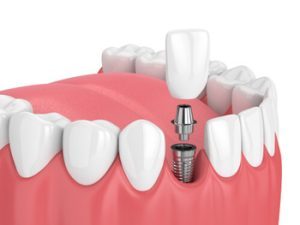Single Tooth Implant Cost Australia: A Comprehensive Guide

Dental implants have revolutionised the landscape of dental care, offering a resilient and aesthetically pleasing solution for missing teeth. These implants serve as an artificial tooth root, firmly anchored into the jaw bone, and provide a sturdy foundation for the replacement tooth. Notably, when one thinks of a dental implant, the single-tooth implant often comes to mind, given its frequent usage in replacing a single missing tooth. The quest to regain a perfect smile might lead many to wonder about the “single tooth implant cost Australia”. While there’s no one-size-fits-all answer, understanding the various factors affecting dental implant cost is crucial.
The cost spectrum can vary from the intricacies of the dental implant procedure to considerations like bone grafting for those with compromised jaw bone structure. As we delve into this topic, we’ll also touch upon related aspects like dental insurance, which can play a role in managing expenses.
Beyond just the financial dimension, it’s essential to remember that dental implants can restore the aesthetics and functionality of natural teeth, making daily tasks like chewing and speaking easier. As we set the stage for an in-depth discussion on the cost of dental implants in Australia, remember that investing in your oral health today can save potential dental procedures and costs in the future.
Understanding Dental Implants

At the heart of dental care advancements is the rise of dental implants, which have offered individuals an innovative means to replace missing teeth. But what exactly is a dental implant? Simply put, a dental implant is an artificial tooth root typically made of titanium. It’s anchored securely into the jaw bone, providing a sturdy foundation for placing an artificial tooth. The result closely mimics the look and function of natural teeth.
Now, when choosing a dental implant for a single missing tooth, the single-tooth implant emerges as the most sought-after solution. The benefits of opting for a single-tooth implant are manifold. Firstly, it ensures that surrounding teeth are not disturbed, which might not be the case with dental treatments like dental bridges. Additionally, a single tooth implant integrates seamlessly with the jaw bone, preventing potential bone loss, often accompanying a missing tooth.
In Australia, dental implants have gained significant traction. As the dental implant procedure evolves, it offers an even more precise and less invasive treatment. The single-tooth implant procedure specifically targets replacing one missing tooth without affecting adjacent teeth, making it an ideal solution for many.
While the single-tooth implant cost in Australia might concern some, the long-term oral health benefits, combined with the aesthetic appeal and function akin to natural teeth, often outweigh initial expenses. After all, investing in dental implants is more than just a dental procedure; it’s an investment in quality of life, confidence, and overall well-being.
Factors Influencing the Cost
The realm of dental implants is vast, and when considering the cost, especially for single-tooth implants in Australia, one might wonder about the disparity in prices across different clinics or regions. It’s crucial to understand that the cost of dental implants is not arbitrary; several factors influence it.
Materials Used:
The materials used in dental implants play a significant role in determining the cost. Titanium, renowned for its durability and compatibility with the body, is a common choice. However, there are also zirconium implants, known for their aesthetic appeal, resembling natural teeth more closely. The choice between these materials can influence the single-tooth implant cost.
Dentists’s Expertise and Experience:
Like any medical or dental procedure, the expertise and experience of the dental professional performing the implant procedure can impact the cost. A highly experienced dentist might charge more, but with their expertise comes the assurance of a well-executed procedure, potentially minimising risks and ensuring a successful implant placement.
Geographical Location and Clinic Overheads:
Geographical factors are often overlooked, but they play a pivotal role. Dental implant costs in urban centres, where operational costs are higher, differ from those in suburban or rural areas. Clinic overheads, encompassing equipment, rent, staff salaries, and more can also contribute to the variation in dental implant prices across different practices.
Additional Treatments:
Only some people are immediately ready for an implant. Some individuals might require additional procedures, like bone grafting, especially if bone loss in the jaw has occurred. Such procedures ensure the jaw bone is strong enough to support the implant. Bone grafting, sinus lifts, or even treatments for gum disease can add to the overall dental implant cost.
It’s also worth noting that while understanding these factors clarifies the cost structure, one should not merely chase the lowest price. Quality, durability, and the assurance of a well-executed dental implant procedure hold immeasurable value for oral health. Dental care should be viewed as an investment in well-being, comfort, and confidence, especially when considering implants.
Lastly, while the initial cost might seem daunting to some, various dental practices offer payment plans, and dental insurance might cover a part of the procedure. It’s always recommended to consult with a dental professional to understand the costs involved, ensuring you’re well-informed before embarking on the journey to restore your smile.
Average Cost of Single Tooth Implant in Australia
Dental implants have revolutionised how we deal with missing teeth, ensuring a solution that feels and functions like our natural teeth. While the benefits are numerous, understanding the financial implications, especially for single-tooth implants in Australia, is crucial for informed decision-making.
Current Market Range:
According to the latest data, Australia’s single-tooth implant cost can vary significantly, starting from AUD 3,000. This broad range of factors in the dental implant procedure, the materials used, and necessary additional procedures like bone grafting.
Comparing Urban vs. Rural Costs:
Geographical location plays a pivotal role in the cost of dental implants. Urban centres, brimming with state-of-the-art dental practices and higher living costs, tend to charge more than their rural counterparts.
For instance, a dental implant in a city like Sydney or Melbourne may be on the higher end of the spectrum due to increased clinic overheads and demand. On the other hand, dental implant costs in more rural areas might be somewhat lower, though the difference is not always drastic.
Variations Among States:
States also exhibit variations in dental implant costs. The national dental fee survey can shed light on these disparities. Still, as a general trend, states with higher populations and more urbanised areas like New South Wales and Victoria might have slightly higher prices. Conversely, states like Tasmania might offer more competitive rates.
Despite these variations, it’s paramount to prioritise quality and the expertise of the dental professional over merely seeking the lowest price. Dental insurance might cover a portion of the cost, and several dental practices offer payment plans, ensuring the dental treatment doesn’t become a financial burden.
The Procedure
 From Consultation to Aftercare
From Consultation to Aftercare
Dental implants emerge as a popular choice when addressing the need to replace missing teeth. They offer an enduring solution, closely mimicking the form and function of natural teeth. For those considering this dental procedure, it’s essential to understand the journey from the initial consultation to aftercare.
Initial Consultation and Its Importance:
Your dental implant journey begins with a comprehensive consultation. This step is pivotal for several reasons. A dental professional assesses the health of your jawbone, checks for gum disease, evaluates adjacent teeth, and determines if you’re a suitable candidate for dental implants. Advanced imaging might be employed to gauge bone density and ensure proper implant placement.
This is also the stage where potential additional procedures, such as bone grafting or sinus lifts, are identified if there’s significant bone loss. Furthermore, the consultation gives patients a clear picture of the dental implant cost, potentially with the help of the national dental fee survey for those in Australia.
The Surgery Process:
The dental implant procedure is methodically planned to ensure the artificial tooth root – usually made of titanium – integrates well with the jawbone. After initial preparations, including tooth extraction or other dental treatments, the implant is placed into the upper or lower jaw.
Over time, the implant fuses with the bone, creating a sturdy foundation for the replacement tooth or teeth. Depending on individual needs and the dental practice’s techniques, this process may involve multiple appointments over months.
Post-Surgery Care and Its Influence on the Overall Cost:
Aftercare is as essential as the surgery itself. It involves ensuring the implant site is free from infection and that the implant is integrating well. Regular check-ups with the dental professional are recommended. Good oral health practices, including regular dental care, are crucial to ensure the longevity of the implant.
Dental implants in Australia, much like elsewhere, require patients to invest not only in the initial cost of the implant but also in aftercare. The longevity and success of dental implants largely hinge on this post-operative care.
While dental insurance may cover some aspects, many patients opt for payment plans to manage the dental implant cost. Also, while the single-tooth implant cost in Australia can vary based on location and specific requirements, viewing it as an investment in one’s oral health and overall well-being is crucial.
Insurance & Financial Assistance
Navigating the financial aspect of dental care, especially with procedures like dental implants, can be daunting. However, understanding the avenues of financial assistance can significantly ease the process.
Dental Insurance: What’s Typically Covered?
Dental insurance often varies in its coverage for dental implants in Australia. While some dental plans might cover a portion of the dental implant cost, others may focus on associated dental procedures like tooth extraction or bone grafting.
It’s imperative to check with your dental insurance provider about specifics. Inclusions like the dental implant procedure or costs related to replacing missing teeth could be covered either partially or wholly, depending on your plan.
Payment Plans and Financing Options:
 Recognising the initial cost of dental treatments, many dental practices offer payment plans to spread the single-tooth implant cost over several months or even years. These plans are often tailored to cater to different financial capabilities.
Recognising the initial cost of dental treatments, many dental practices offer payment plans to spread the single-tooth implant cost over several months or even years. These plans are often tailored to cater to different financial capabilities.
Additionally, third-party companies partner with dental professionals to provide financing options, making dental implants cost more manageable for patients. Such payment plans can be a boon for those looking at tooth replacement options without the immediate financial strain.
Conclusion
Understanding the nuances of the cost of dental implants in Australia is pivotal for making informed decisions about your oral health. Whether it’s the single-tooth implant cost or the intricacies of the dental implant procedure, it’s crucial to be equipped with the right knowledge. Prioritising oral health ensures the longevity of your natural teeth and boosts overall well-being.
Remember, with every missing tooth, there’s an effective tooth replacement solution waiting for you. Don’t let uncertainties deter you. Contact My Local Dentists at (02) 9000 1383, and let our professionals guide you through your dental journey.
References:
https://www.dentalhealth.org/Blog/dental-implants-and-how-crucial-replacing-teeth-really-is
https://www.verywellhealth.com/what-to-expect-during-a-dental-implant-procedure-1059372
https://www.finder.com.au/dental-implants
https://www.realself.com/surgical/dental-implants
